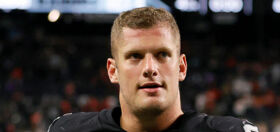
The Olympics have been around for a century plus some change, and it’s probably not a huge shock that for most of that time, LGBTQ athletes haven’t had a great time.
There’s a fantastic writeup on Outsports by Olympic historian Tony Sculpham-Bilton, detailing some of the terrible trials that the world put queer athletes through for decades. They’re generally pretty grim, and often involve the Nazis.
For example, there’s Niels Bukh, a Danish gymnast whom Hitler recruited. He was secretly gay when he participated in the Stockholm Olympics in 1912, but outed by a former partner after he started working for the Nazis.
Related: Sia Lends Her Voice To Unusually Gritty — Though Sexy — Olympics Ad
How about we take this to the next level?
Our newsletter is like a refreshing cocktail (or mocktail) of LGBTQ+ entertainment and pop culture, served up with a side of eye-candy.
Prior to the rise of Hitler, Germany was a fairly accepting place for LGBTQs, and sent gay Olympian Otto Pelzer to compete in 1928. Rather than working for the Nazis, he was arrested for homosexuality and imprisoned at a concentration camp for years. Following the war, he fled to India, coached there for several years, then died of a heart attack in 1970.
Then there was Helen Stephens, an American who ran an incredibly fast 100 meter dash. Her story is particularly strange: after she won, accusations flew that she was actually a man. Someone from the Olympics actually checked her and confirmed that she was a woman. But one of her accusers, Poland’s Stanislawa Walasiewicz, later turned out to be intersex.
Related: Tom Daley Models Nearly Nonexistent New Speedo For The Olympics
The first openly gay athlete wouldn’t compete until 1988. Equestrian Robert Dover from America came out during the Olympics in Seoul. His partner, Robert Ross, is an equestrian as well.
And that’s only scratching the surface of the often-strange, usually-dark history of queer people in the Olympics. Read up on our history, and remember to thank your lucky stars that you’re living at a time when athletes can be openly out proud.

















He BGB
Remember when everyone freaked out when the HIV+ diver hit his head on the board and bled in the water? What idiots. And we always hear about the Jews being rounded up and tortured by the nazis but rarely the gay people who didn’t fit in with the grand plan who were rounded up too.
Brian
There was no such thing as an LGBTQ athlete in those days. That’s because there was no such thing as LGBTQ. LGBTQ or QBTGL or GLBTQ – call it what you like – simply did not exist. There was no such thing as the identity politics you see in the form of those de-humanizing labels today.
In those days, there were tons of men who had homosexual feelings just like they do today. But they were not LGBTQ. They did not put a stamp on their forehead like they do today.
jjose712
@He BGB: The HIV+ was Greg Louganis, simply the best diver of all times.
The world moved, but in sports the story is different.
Last year there was a bitter fight between spanish and italian bikers in moto gp. Italian journalists accused the former champion Marc Marquez of helping his compatriot Jorge Lorenzo to win the champinonship in detriment of italian champ Valentino Rossi. Once the war started the italian journalist basically accused (and accused is the right word in this case) Marc Marquez of being gay, because he has two openly gay friends in his close group (and everybody knows that being gay is very contagious) and being very close to his mother (which is very funny because that’s a very italina cliché).
Curiously, this year, after breaking up his relationship of ten years with his girlfriend it was Valentino Rossi the one accused of being gay.
So bike competitions doesn’t seem to be the most gay friendly sport (even when some of the bikers are quite gay friendly).
And i suppose it’s even worse in team sports
tardis
@Brian: What’s your point? Hardships existed with or without labeling gay community.
Sluggo2007
@Brian: I think you need to check your batteries. There seems to be a weak (or non-existent) signal.
Sluggo2007
I’m very surprised that nobody mentioned Olympic figure skaters. However, it is only in THIS country that figure skating is perceived as a gay sport, largely due to the history of the American competitors. The rest of the world acknowledges the tough and competitive sport that it is and skaters from those countries are predominately straight.